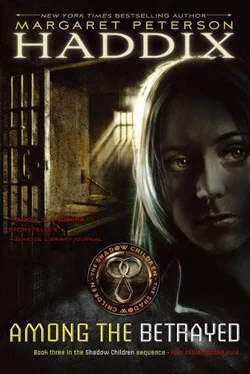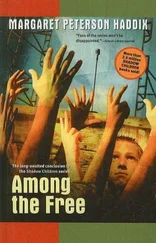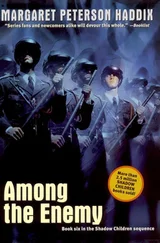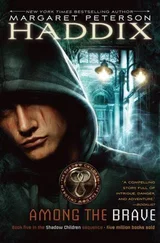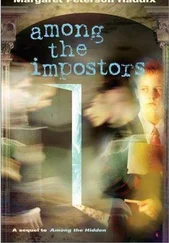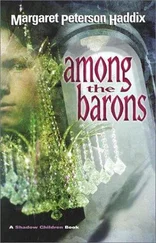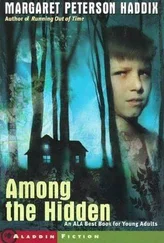"Time? You've been in there for days," the hating man ranted back during one interrogation session in the middle of the night. "How long does it take to say, 'My parents are so-and-so. What are your parents' names?'"
For one terrifying instant Nina thought he really was asking her her parents' names. Against her will her lips began to pucker together to form the first syllable of her mother's name.
Rita. My mother's name is Rita. My father's name is Lou. Gran's name is Ethel. And
7 am…
Nina bit down hard, trapping all those words in her mouth. The hating man didn't seem to notice. He was pacing, facing away from her. He continued fuming.
"Even first names would help. Even initials. You've got to give me something."
He hadn't been asking her her parents' names. He'd merely been telling her the question she was supposed to ask the others. Nina's heart pounded out a panicky rhythm that made it hard for her to think.
What if. . what if he doesn't care about my parents' names because he already knows them? What if he already knows about Gran and the aunties? Is that why he never asks?
Nina frantically tried to remember if she'd ever breathed a word about any of her family to Jason. She hadn't, had she? Talking to Jason, she'd wanted to seem exotic and desirable. A grandmother and a bunch of old-maid aunts didn't really fit that image.
The hating man was done pacing. He whirled on his heel, put his face right up against Nina's. They were eye to eye, nose to nose.
"You cannot play around with the Population Police, little girl," he said. "That's how people die."
Nina quivered.
The man stalked out and slammed the door behind him.
Nina sat alone, terrified, in the luxurious interrogation room. The table in front of her was loaded down with bowls of food. She'd been eating ravenously during their conversation. Perhaps because it was the middle of the night, instead of midday, the foods were snacks, not a real meal, mostly things Nina had never tasted before: popcorn, peanuts in their salty shells, orange cheese crackers, raisins in delicate little boxes. Nina was still starving — she was always starving, she couldn't think of a single time in her entire life when she'd had her belly completely full. But she couldn't bring herself to eat another bite, not with the hating man's threat echoing in her ears. Still, she found herself reaching out for the bowl of peanuts. She watched her own hands lift the bowl and pour its contents down the front of her dress, making a bag of her bodice. She cinched her belt tighter, holding the peanuts in at her waist. She'd barely finished when the guard opened the door.
"He's done with you early, I hear," the guard growled. "Back to the cell with you."
Nina stood slowly. None of the peanuts fell out. She crossed her arms and held them tightly at her waist, keep-ing the belt in place. She took a step, and then another, and nothing happened. The peanut shells tickled, but Nina didn't care.
I'm stealing food from the Population Police!
Nina thought.
I'm getting away with it!
Walking back to her cell, Nina did not feel like a girl who'd nearly betrayed her parents, whose beloved Gran and aunties might be in danger. She did not feel like an illegal child, with no right to live. She did not feel like a lovesick, silly teenager who'd been betrayed by the boy she'd fallen for. She did not feel like a potential traitor to her own kind.
She felt giddy and hopeful, crafty and capable. All because of the rustle of peanut shells under her dress.
Nina kept stealing food. Invariably, during every meeting with the hating man there came a time when he'd leave the room briefly— to confer with the guard, to go to the bathroom, to get a new pen. And then Nina would grab whatever food was nearest and stuff it down her dress, in her socks, wherever she could. She took apples, oranges, biscuits, raisins. She took dried bananas, unshelled walnuts, cereal boxes, oat' meal bars still in their wrappers. She stole another of the bags the guard brought black bread in, and took to carrying it around with her, tied under her dress, so she could swipe even more food each time.
The problem was, she didn't know what to do with the food she stole.
She was hungry. She could easily have eaten it all herself. But once she was back in her jail cell with the other three, her stomach squeezed together at the thought of eating so much as a crumb of the stolen food. What if they heard her chewing? How could she eat such delicacies while they were starving, right there beside her? (How could she eat any of the Population Police's food when the other three were starving?)
She did think about sharing. That was probably why she'd reached for the bowl of peanuts in the first place, because she felt so guilty about not taking the rolls for Alia. But how could she explain where she'd gotten all that food?
An evil thought crept into her mind one night when the guard shoved her back into her cell and she saw the other three cuddled together. Nina sat down beside them and leaned into Alia, and Alia squirmed away in her sleep, closer to Matthias. The ground was wet and hard, and Nina was freezing. Everything seemed hopeless; Nina didn't care what happened to anyone else as long as she got warm, as long as she got dry clothes, as long as she got out of jail.
I could use the food, she thought.
Like a bribe. I could tell them they can have as much as they want to eat, as long as they tell me their secrets. No —
I'd dole it out, a peanut at a time, a raisin at a time, with every one of my questions. Who's "Sa-"? Where'd you get your I.D.'s? Who else should have been arrested with you?
Nina didn't do it. She just kept stealing food she couldn't eat, couldn't give away, couldn't use. She felt like she'd been in prison forever and she would stay in prison for' ever. She saw nothing ahead of her but more nights sleeping in damp, filthy clothes on cold, hard rock, more days trying to overhear the others' whispers, more ran-domly spaced trips to the hating man's room, where he yelled at her and gave her food she could not eat, only steal.
Then one day he cut her off.
"You have twenty-four hours," the hating man barked at her. "That's it."
Nina stared back at him, her brain struggling to comprehend. She'd practically forgotten that twenty-four hours made a day — that there were things such as numbers and counted-off hours in the world.
"You mean. .," she said, more puzzled than terrified.
"If you do not tell me everything I need to know by" — he looked at the watch on his wrist—"by ten'oh-five tomorrow night, you will be executed. You and the three exnays."
Nina waited for the terror to come, but she was too numb. And then she was too distracted. Mack, the guard, was pounding at the door to their meeting room. The hat-ing man opened it, and Mack stumbled in, slumping against the table. Nina saw he still clutched the ring of keys he always used to get her in and out of her cell. His long arms hit the wood hard. Then his fingers released, and the keys went sliding across the table and onto the floor.
"Poi—," Mack gulped. "Poisoned…"
The hating man sprang up and grabbed a phone, punching numbers with amazing speed. 'Ambulance to the Population Police headquarters immediately!" he demanded. "One of our guards has been poisoned."
He dragged Mack out into the hall, Mack's feet bounc' ing against the floor. "Stay with me, Mack," the hating man muttered. "They're coming to help you."
"Unnhh," Mack groaned.
Both of them seemed to have forgotten Nina. Nina looked down and saw the guard's key ring on the floor, just to the left of her chair. All the keys stuck out at odd angles. Slowly, carelessly, as if it were nothing more than just another stray peanut shell, Nina bent down and picked up the whole ring.
Читать дальше
